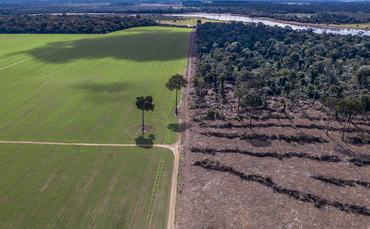WWF calls on government to set legally-binding target to eradicate both legal and illegal deforestation from UK supply chains
The government and businesses are facing growing pressure to strengthen efforts to eradicate deforestation from UK supply chains, after a new YouGov survey revealed more than three-quarters of the public do no not want the products they buy to contribute to the destruction of forests overseas.
Of almost 1,700 adults polled, 68 per cent said they supported setting a target date in law to remove all deforestation from UK supply chains, with just four per cent opposed to such a move, according to the survey, which was commissioned by WWF.
The results of the poll also reveal significant demand for businesses to do more to tackle the problem, with 35 per cent of respondents believing companies are primarily responsible for ensuring goods sold in the UK do not support the destruction of nature overseas, according to WWF.
The conservation charity said the survey results demonstrated there was “overwhelming” public support for more robust efforts to combat deforestation in the supply chains of products such as soy, beef, timber, palm oil, pulp, paper, and cocoa.
Demand for such products continues to grow rapidly around the world and is widely blamed for fuelling mass deforestation – both legal and illegal – in Asia, Africa, and South America, where forests are frequently cleared to make way for commodity cultivation and production. As well as destroying critical habitats, the loss of forests is exacerbating the climate crisis as trees and soils are natural carbon sinks thought to hold huge amounts of CO2.
WWF research earlier this month estimated that an area of forest totalling 43 million hectares – almost double the size of the UK – has been wiped out in just the last 13 years, with commercial agriculture a leading cause.
Kate Norgrove, executive director of advocacy and campaigns at WWF, said protecting and restoring forests such as the Amazon was critical to tackling the world’s escalating ecological and climate crises. “Nature is in freefall and our climate is in crisis,” she said. “Our poll shows an overwhelming majority of people in the UK want to stop the things they buy and the food they eat from causing deforestation overseas, and the UK government has a duty to respond.”
To assist businesses in combatting deforestation in their supply chains, the conservation charity is developing an Ethical Sourcing Tool for brands, manufacturers, retailers, and the food service industry to help set and implement robust commitments and targets for curbing the environmental impact of their supply chains.
Moreover, Norgrove urged the government to adopt a new, legally-binding target to make UK supply chains deforestation-free by 2023 as part of the Environment Bill, the flagship piece of post-Brexit green legislation the publication of which was once again controversially delayed earlier this week.
For its part, the government has announced plans for a series of measures designed to combat illegal deforestation in UK supply chains, which would require larger businesses to make sure the commodoties they use have been produced in compliance with local laws or risk facing fines. Further details on the proposed legislation are expected to emerge in the coming months.
However, WWF is calling for the government to go further by introducing rules that cover all deforestation – whether legal or illegal – and announcing a legally-binding target date for 2023.
A spokesperson for the Department for the Environment, Food and Rural Affairs (Defra) said it aimed to make sure it was a requirement for larger businesses to undertake due diligence on their supply chains “where there is a risk they could be contributing to illegal deforestation”.
“This is just one piece of a much larger package of measures that we are putting in place to tackle illegal deforestation,” they added in a statement. “While the UK is a relatively small consumer of commodities such as soya, businesses must take greater responsibility for ensuring the resilience, traceability and sustainability of their supply chains.”
The results of the new poll came as a separate report by Global Canopy yesterday claimed almost 100 global investors and financial institutions are providing a total of $2.7tr backing for projects and firms which are fuelling deforestation, most of which have no anti-deforestation policies in place.
The environmental NGO said due diligence laws were essential to accelerate progress against deforestation, but it echoed WWF in arguing such efforts should cover both legal and illegal deforestation, and be backed by standardised reporting for companies alongside strong sanctions for non-compliance.
Niki Mardas, executive director of Global Canopy, said the NGO’s research showed a significant majority of the world’s largest financial institutions were “looking the other way on this vital issue”, adding that this apparent indifference to forest-related risks “sends a terrible message to the market”.
“There is no solution to climate change without a solution to deforestation,” he said. “Strong policies are a basic first step, setting clear expectations for the companies they finance, and demonstrating a strategic approach to the climate and nature crisis. Emerging due diligence legislation will favour early movers, and must include the finance sector in its remit, with sanctions for those who fail to act.”


